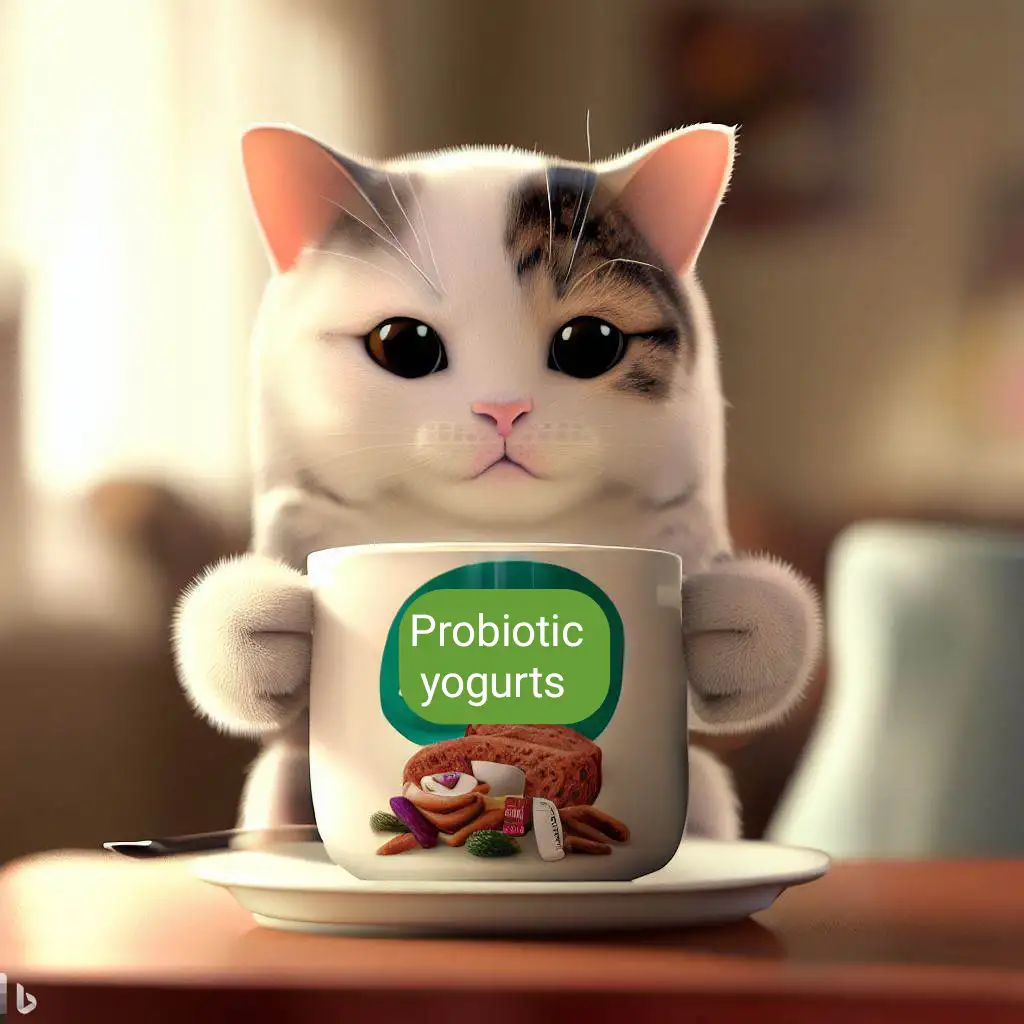Can Cats Eat Probiotic Yogurt? + 5 Best Probiotic Yogurt For Cats

Can cats eat probiotic yogurt? While many people may be confused about this, it’s good to note that not all yogurts are probiotics, although most are. There must be a high level of good bacteria in yogurt to benefit your cat. Some yogurts are heated after they are cultured, which destroys the microbes.
My cat will always rush to me and give me those kitten eyes and a soft meow each time she sees me with heavy whipping cream or a pack of yogurt. As much as her eyes may appear convincing, I don’t just give her any yogurt, as there are specific probiotic yogurts that will be beneficial to her.
When it comes to yogurt, there are specific quantities to give to a cat to achieve certain benefits, or it becomes counter-effective, as giving too much could result in stomach upset and lactose intolerance, which is why this article contains a solid list of the best probiotic yogurts for cats.
Table of Contents
- Can Cats Eat Probiotic Yogurt?
- Can kittens eat probiotic yogurt?
- Benefits of feeding cats probiotic yogurt
- Can cats eat probiotic yogurt every day?
- How to Feed Probiotic Yogurt to Your Cat
- The Best Probiotic Yogurt for Cats
- Final Thoughts
Can Cats Eat Probiotic Yogurt?
Yogurts are made with bases such as pasteurized cow, goat, sheep, and milk alternatives like coconut, soy, and almond. However, the bacteria fermenting the base determines whether it is yogurt.
Cats can safely eat probiotic yogurts, as they can help with diarrhea, restore a healthy balance of bad and good gut microbiota, reduce cholesterol levels if needed, and provide other benefits.
A probiotic yogurt has to be made with the bacteria Lactobacillus bulgaricus and Streptococcus thermophilus. These cultures reproduce and grow in number as they feed off the base they are added to, which makes the base thicken. The result of this reaction is what creates the sour flavor and creamy texture of yogurt.
After the fermentation process is completed, the product is not meant to go through any other process that could destroy the microbes, keeping the friendly bacteria alive.
Can kittens eat probiotic yogurt?
Kittens can eat a small amount of probiotic yogurt, but you should ensure it is plain and void of artificial sweeteners.
Probiotic yogurts won’t have any nutritional benefits for your kitten, so I would advise you not to give them some, as you may only end up upsetting their delicate stomach.
Benefits of feeding cats probiotic yogurt
Just as probiotic yogurts benefit humans, they also have lots of benefits for cats as a result of their protein content, vitamins, minerals, and probiotics (healthy bacteria).
Great source of protein
Cats love a high-protein diet, as it keeps them lean and gives them energy. A cat should be fed at least 4 grams of protein per kilogram of body weight. Although not compared to the proteins fish or meat can offer cats (and should make up the bulk of the cat’s diet), probiotic yogurts have about 4.5 grams of protein per 3-ounce serving, which can be beneficial to your cat.
Contains probiotics
This is the major reason why you should give your cat some yogurt. Probiotics aid in digestion and help relieve diarrhea, gas, and stomach pains.
These probiotics can also help prevent gum disease in cats and even help with hairballs. However, you should note that yogurt is not the most efficient way to add probiotics to your cat’s diet. Speak to your vet about probiotic supplementation if your cat needs it.
Provides healthy nutrients
Yogurt contains many minerals and vitamins, such as calcium, which can aid in stronger bones, healthy dentition, and muscles. You can also find vitamins B2, C, B12, D, and potassium. The magnesium in probiotic yogurts will help your cat effectively absorb these nutrients and regulate their blood pressure.
Can cats eat probiotic yogurt every day?
If your cat loves yogurt like mine, you can safely feed them yogurt every day. But ensure the yogurt is plain, void of flavors with fruits, free from sweeteners, and doesn’t undergo any heating process after fermentation (as the good bacteria would be killed).
How to Feed Probiotic Yogurt to Your Cat
To feed your cat probiotic yogurt without any negative effects, you must ensure the yogurt is given as a treat and isn’t fed to your cat more than five times a week( a tablespoon each day). You can mix it into their food.
Another way you can calculate the safe amount to feed cats is by obeying the 10% daily intake of treats rule. 90% of your cat’s food and calorie intake should come from quality kibble or wet foods. Each tablespoon of probiotic yogurt contains 11 calories.
Ensure to discontinue feeding your cat probiotic yogurt if they vomit or start having diarrhea after you feed them some, as this may indicate they are allergic to the yogurt.
The Best Probiotic Yogurt for Cats
Probiotic yogurts are essential for your cat’s overall well-being as they could boost their immune system and do lots of the good we listed above, and there are no questions on whether they deserve a spot in your cat’s regular treats. But what are the best probiotic yogurts for cats?
To ensure that you are picking a good probiotic yogurt for cats, you should be on the lookout for the words “lactobacillus acidophilus” and “live active cultures” on the label, as they produce lactase, which is easier for cats that are susceptible to dairy to digest. Also, ensure that no sweeteners like xylitol are used and that it’s as natural as possible.
1. Siggi’s Icelandic Skyr
This is among my favorite probiotic yogurts for cats. It is creamier and thicker than Greek yogurt, has low sugar, and contains live, active bacteria that aid gut health.
2. Chobani non-fat plain Greek yogurt
This great probiotic yogurt is low in sugar and contains the live bacteria needed.
3. Stonyfield Farm Organic
Stonyfield Farm organic yogurts are non-GMO and contain lots of live cultures. They also have soy yogurt, which can be great for dairy-intolerant cats.
4. Nancy’s Probiotic Plain Low-Fat Yogurt
Nancy’s produces one of the best probiotic yogurts for cats, as it has lots of live good bacteria.
5. Milk alternatives like almond, coconut, and soy
Although these are great cow milk alternatives, they still have substantial fat content and may still trouble your cat, but they are better off when deciding which probiotic yogurt to feed a lactose-intolerant cat.
Don’t forget that all these yogurts were made for humans, and cats should be fed in moderation.
Final Thoughts
Probiotic yogurt for cats can be very beneficial, especially if your cat has IBS or is suffering from constipation and diarrhea. They contain lots of good bacteria that aid gut health, prevent gum disease, and promote a healthy immune system. When given in moderation, they can provide their benefits without being counterproductive.



